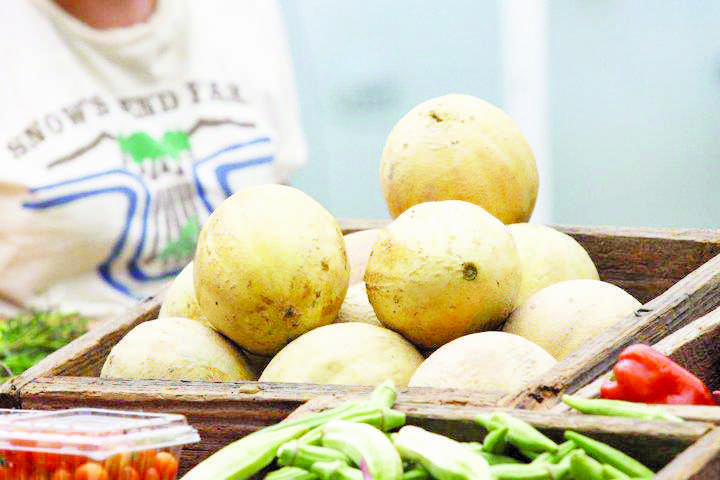Finals season lasts two weeks, football season three months – and farmer’s market season for Homegrown Alabama lasts six months. And like studying for finals or tailgating, it often comes with competitions, food and photography.
Co-Market Manager Dabney Powell said Homegrown Alabama will fill its summer season with a weekly farmer’s market, as well as special market events highlighting seasonal produce.
“Market events typically involves free recipe demonstrations and recipe cards, recipe competitions among customers, games, crafts [and] a photo booth,” Powell said. “They’re all a little different, but are always fun and keep things interesting.”
The Sweet Homegrown Alabama Honey and Cheese Fest, held Thursday, June 5, featured honey from Hewett’s Honey Farm in Duncanville, Alabama, and cheese from AA Creamery in Millbrook, Alabama.
Aric Adams of AA Creamery said the creamery will be back for its third season with Homegrown Alabama.
“It’s one of our favorite markets. We really like the atmosphere and the customers. We like how they do different things through the season to highlight different products,” he said. “We just think that’s neat for educating the public about fresh seasonal produce.”
Adams said cheeses sold will range from fresh goat cheese to mozzarella.
“[Farmer’s markets are] our number one outlet for our product,” he said.
Powell said events planned for the summer include a peach festival June 19, a Bama Loves Tomatoes festival July 3 and a Melon Celebration on July 24.
“We’ll plan more events as the summer goes on and the crops keep coming in,” she said.
While the summer slows traffic and can make it difficult to find workers, it also allows them to focus on serving non-student customers in the area.
Homegrown Alabama began nine years ago in the Ferguson Center plaza once a semester. Today, it takes Bama Cash in addition to credit and debit cards. Cash can be exchanged for wooden tokens. A grant from Canterbury Episcopal Church funds an incentive program for users of EBT/SNAP benefits.
“To encourage people who have EBT, or what used to be called food stamps, to use their money at the market, we always give $5 with any purchase,” Camp said.
There are also EBT/SNAP Double Days, during which Homegrown Alabama matches EBT/SNAP purchases over $10 and up to $25, Powell said.
Powell and Calee Camp, co-market manager, regularly work their Thursday farmer’s market from 3 p.m. to 6 p.m. Camp said volunteers are welcome to help with the process, which includes planning, advertising, set-up and breakdown in addition to running the market itself.
While the summer slows traffic and can make it difficult to find workers, it also allows them to focus on serving non-student customers in the area.
“If you want to come work, come,” Camp said. “If you are a regular and someone who is super involved and helpful, we most likely will give you a position with a title that comes with a little more responsibility.”
Camp said Homegrown Alabama currently has an almost all new staff and just underwent a vendor expansion that pushed them to the limits of their current location, the lawn of Canterbury Episcopal Church.
“We like the closeness and working with the church,” she said. “We hope to keep the local entertainment coming, and we have also been trying to involve more student groups. Different branches of the college are always welcome to have a place at the market, especially if it’s health-related.”
Powell said Homegrown Alabama’s student population keeps it fresh and changing. The biggest change over the past year has been new leadership, she said.
“Homegrown Alabama is a student group, so every few years the leadership changes over as people graduate and leave Tuscaloosa. That keeps the ideas flowing and injects new life into the market,” she said. “Next May, Calee and I will both graduate, and leadership will change over again. I think that it is great that there is always potential for new ideas and management strategies as people come through.”
This year, she said, Homegrown Alabama aims to increase its partnerships with other student organizations.
“All of our members are studying different things, and not all of us are in programs of study that focus on food or sustainability,” she said. “I think it makes sense for us to collaborate with other groups on campus to help them get the word out for their cause and to help Homegrown reach a broader audience.”
On a community level, Powell said, the market both educates and unites a diverse group.
“All kinds of different people shop at the market. Some of them are students, faculty, members of the community, kids, parents, high school students – all kinds of people outside of the college crowd,” she said. “It’s a fun way to meet new friends, and you get the opportunity to talk to the farmers who have produced the food customers are there to buy.”
Camp said she hopes the social gathering aspect of the market brings closeness to students and the community.
“I hope we help promote clean farming while supporting the local economy with sustainable farming. I hope we encourage the people of this town and others close by, as well as the students, to eat healthy, know your food and know your farmer,” she said. “We offer cheaper, more delicious options closer to campus that is easily accessible, whether you are picking up your groceries for the week or grabbing a snack between classes.”









